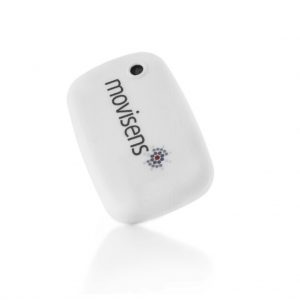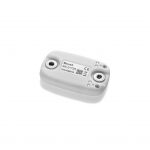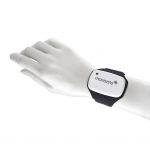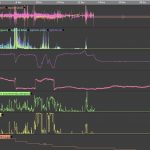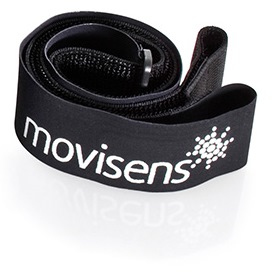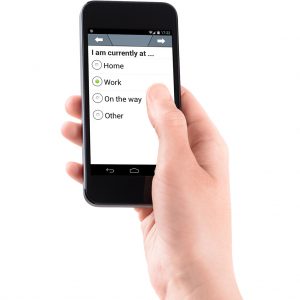LightMove 3 – Light and Activity Sensor
The LightMove 3 sensor can be used to determine the physical activity of a user and also detect the ambient light of their surroundings. The combination of these two parameters allows information to be calculated about the behaviour, activity, and the environment of a subject in just a few small steps. The collected data can be processed on-board the sensor in real time and then transmitted to a mobile phone via a Bluetooth Smart connection.
In addition to the on board processing, the raw data is recorded for a measurement period of up to 2 months. This data, including the 3D acceleration, barometric pressure, temperature, and the parameters of ambient light can then be further processed as required. Wearing the sensor on a wristband offers a high degree of comfort and unrestricted range of motion, so that the subject can pursue their everyday life without hindrance.
Output parameters such as illumination intensity (lux), brightness (from darkness to sunlight), temperature, colour, activity classes, steps, energy expenditure and metabolic equivalents (MET) can be easily calculated by using our DataAnalyzer software. This software allows complex processing of the data and the generation of meaningful reports (PDF) in just a few simple steps. These output parameters can allow a thorough evaluation of the environment of the subject, determining such factors as time indoors vs. outdoors and what level of physical activity the subject has performed.
View latest version
Apply for free student project
Top features
- Live analysis of data on the sensor
- Bluetooth-Smart Interface
- Exact and validated recognition of activities
- Exact and validated energy conversion
- Detection of ambient light
- Analysis of radiation intensity
- Detection of usage vs. non-wear time
- Barometric sensor enabling more precise evaluations
- Sustainable data format
- Practical and easy to use in studies
- No restriction of the subjects in everyday activities
- Java API for USB (Windows)
- API: Example implementation for Bluetooth Smart (Android)
Applications
- Interactive ambulatory assessment
- Sleep analysis
- Behavioural monitoring
- Mobile long term monitoring of physical activity
- Mobile long term monitoring of ambient light
- Energy estimation and activity detection
- Step detection
- Detection of inactivity, sitting, and standing
- Capable of integration into complex systems
Matching products and services

SensorTrigger
movisensXS-Feature for Interactive Assessment
Activity triggered eDiaries and Event Contingent Sampling
Downloads
| Newsletter |
|
|---|---|
| Software |
|
| Documentation |
|
| Data examples |
|
| External Tools |
Technical data
|
Power supply |
Lithium-Polymer-Battery |
|
Supply voltage |
3 V |
|
Battery voltage |
3,0 - 4,2 V |
|
Number of charging cycles |
300 with 1C/1C > 80% |
|
Maximum recording capacity |
2 months |
|
Battery run time (recording) |
~ 9 days |
|
Size of sensor (W x H x D) |
62,3mm x 38,6mm x 11,5mm |
|
Weight of sensor |
26 g |
|
Internal sensors |
Ambient light sensor: Channels: 5 (red, green, blue, clear, ir) Measurement range: 0 - ~45 000 lux Resolution: Up to ~0.011 lux (at low end) Output rate: 1 Hz
3D acceleration sensor: Measurement range: +/- 8 g Noise: 4 mg Output rate: 64 Hz
Pressure sensor: Measurement range: 300 - 1100 hPa Noise: 0,03 hPa Output rate: 1 Hz |
|
Indicators |
LED, 3-color (operation and charging status) Vibration alarm (Bluetooth Smart is disconnected) |
|
Interfaces |
Micro-USB, Bluetooth Smart |
|
Environmental conditions |
Temperature: -20 °C to 60 °C 0 °C to 45 °C during charging
Humidity: 0 to 75% relative humidity
Atmospheric pressure: 300 to 1100 hPa absolute |
Literature and Validation
- Actigraph-Measured Movement Correlates of Attention-Deficit/Hyperactivity Disorder (ADHD) Symptoms in Young People with Tuberous Sclerosis Complex (TSC) with and without Intellectual Disability and Autism Spectrum Disorder (ASD)..
- Accuracy of Sedentary Behavior–Triggered Ecological Momentary Assessment for Collecting Contextual Information: Development and Feasibility Study.
- Mood and dysfunctional cognitions constitute within-subject antecedents and consequences of exercise in eating disorders..
- OREBA: A Dataset for Objectively Recognizing Eating Behaviour and Associated Intake..
- Improving mobility and participation of older people with vertigo, dizziness and balance disorders in primary care using a care pathway: feasibility study and process evaluation.
- Fear of Physical Activity, Anxiety, and Depression. Barriers to Physical Activity in Outpatients With Heart Failure?.
- The Freiburg sport therapy program for eating disorders: a randomized controlled trial..
- Using Acceleration Data for Detecting Temporary Cognitive Overload in Health Care Exemplified Shown in a Pill Sorting Task.
- Sedentary behavior in everyday life relates negatively to mood: An Ambulatory Assessment study.
- Promotion of physical activity-related health competence in physical education: study protocol for the GEKOS cluster randomized controlled trial.
- Dynamics of Intraindividual Variability in Everyday Life Affect Across
Adulthood and Old Age. - Real-Time Detection of Spatial Disorientation in Persons with Mild Cognitive Impairment and Dementia.
- Neural correlates of individual differences in affective benefit of real-life urban green space exposure.
- Energy Expenditure During Incline Walking – Benefits of Integrating a Barometer into Activity Monitors.
- Individual Differences in the Competence for Physical-Activity-Related Affect Regulation Moderate the Activity–Affect Association in Real-Life Situations.
- Embodied learning in the classroom: Effects on primary school children's attention and foreign language vocabulary learning.
- Intermittent Fasting (Alternate Day Fasting) in Healthy, Non-obese Adults: Protocol for a Cohort Trial with an Embedded Randomized Controlled Pilot Trial.
- A novel algorithm for detecting human circadian rhythms using a thoracic temperature sensor Article history :.
- Physical Activity and Depressive Mood in the Daily Life of Older Adults.
- Measuring Fear of Physical Activity in Patients with Heart Failure.
- Lightweight Visual Data Analysis on Mobile Devices - Providing Self-Monitoring Feedback.
- Contributions à l’élaboration d’un système d’aide médico-sociale à l’aide d’un robot humanoïde.
- Situationsadaptive Navigationsassistenz für Menschen mit Demenz.
- Real-Time Management of Multimodal Streaming Data for Monitoring of Epileptic Patients.
- Bewegungsangst bei chronischer Herzinsuffizienz – Erste Ergebnisse zur Validierung eines Messinstruments..
- Fitness, kognitive Leistungsfähigkeit und Wohlbefinden bei jungen Erwachsenen - Interventionsstudien zum Einfluss von Ausdauertraining.
- Validation and comparison of two methods to assess human energy expenditure during free-living activities.
- Erfassung körperlicher Aktivität mittels Akzelerometrie - Möglichkeiten und Grenzen aus technischer Sicht.
- Home-based system for physical activity monitoring in patients with multiple sclerosis (Pilot study)..
- Detection of Parameters to Quantify Neurobehavioral Alteration in Multiple Sclerosis Based on Daily Life Physical Activity and Gait Using Ambulatory Assessment.
- Using Support Vector Regression for Assessing Human Energy Expenditure Using a Triaxial Accelerometer and a Barometer.
- A Comparison of Two Commercial Activity Monitors for Measuring Step Counts During Different Everyday Life Walking Activities.
- The Association between Short Periods of Everyday Life Activities and Affective States: A Replication Study Using Ambulatory Assessment.
- Characteristics of the activity-affect association in inactive people: an ambulatory assessment study in daily life.
- Acute and medium term effects of a 10-week running intervention on mood state in apprentices.
- Measurement of daily mobility under fampridine-therapy with Movisens-system in patients with multiple sclerosis.
- Assessment of Human Gait Speed and Energy Expenditure Using a Single Triaxial Accelerometer.
- Aktuelle Messverfahren zur objektiven Erfassung körperlicher Aktivitäten unter besonderer Berücksichtigung der Schrittzahlmessung.
- Kindergarten in Bewegung. Zur Qualität von Bewegungskindergärten..
- Assessment der Mobilität im Alltag zur Unterstützung von MS-Patienten.
- A new method to estimate energy expenditure using accelerometry and barometry-based energy models.
- Validity of the kmsMove-sensor in calculating energy expenditure during different walking intensities.
- Estimation of energy expenditure using accelerometers and activity-based energy models - validation of a new device.
- Trends und Möglichkeiten zur Erfassung körperlicher Aktivität im Alltag.
- Einsatz sensorgestützter Verfahren im Gesundheitswesen: Herausforderungen und Lösungsansätze.
- Bewegungskindergärten: empirische Befunde und praktisches Wissen.
- Energieumsatzmessung mit Aktivitätssensoren – Validität des kmsMove-Akzelerometers.
You can find more publications here.
